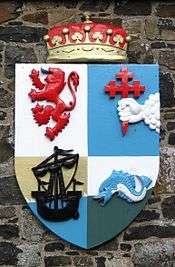MacDonnell of Antrim

The MacDonnells of Antrim (Gaelic: Mac Domhnaill; Ulster-Scots: M'Donnals),[1] also known as the MacDonnells of the Glens, are a branch of the primarily Scottish-based Clan Donald in Ireland. Initially part of Clan MacDonald of Dunnyveg (Clan Donald South), the MacDonnells of Antrim became their own branch in 1558 when Somhairle Buidhe MacDonnell obtained the lordship of the territory in Ireland from James MacDonald, 6th chief of the Clan MacDonald of Dunnyveg.[2] The MacDonnells of Antrim were a sept of the powerful Clan Donald of the royal Clann Somhairle, (see Lords of the Isles), that the English crown had attempted to cultivate since the early 14th century in its efforts to influence the course of politics in Scotland. The MacDonnells established a growing presence in Ireland throughout the 15th and 16th centuries, and played a crucial role in the politics of 17th century Ireland. Today the surname is predominantly spelled McDonnell in Ireland and abroad. Many of the present day McDonnells have a common descent from Sorley Boy MacDonnell.
History
Origins
The MacDonnells of Antrim are descended from John Mor MacDonald, chief of the Clan MacDonald of Dunnyveg. John Mor MacDonald was the second son of Good John of Islay, Lord of the Isles, 6th chief of Clan Donald, through John of Islays second marriage to Princess Margaret Stewart, daughter of King Robert II of Scotland.
John Mor MacDonald married Margery Byset, daughter of the Mac Eoin Bissett, Lord of the Glens of Antrim. Although the MacDonnells would a century and a half later claim that her dowry included the lordship itself, this is false because the Mac Eoin Bissetts remained in possession of it into the early or mid 16th century.[3] However following the death in battle, in support of his friends and kinsmen the O'Neills against the O'Donnells, of the last known Mac Eoin Bissett in 1522,[4] the recently arrived MacDonnells appear to have started making their own gains in the region and eventually used the earlier marriage to claim they had rights to the Bissett lordship. The MacDonnells already possessed Dunnyvaig Castle on the Isle of Islay and lands in Kintyre, Scotland.
The MacDonnells of Antrim did not become a separate branch of Clan Donald until 1558, when they were part of Clan MacDonald of Dunnyveg, when Somhairle Buidhe MacDonnell obtained the lordship of the territory in Ireland from James MacDonald, 6th of Dunnyveg.[2]
15th century
John Mor was assassinated by James Campbell in 1427. John's son Donald Balloch MacDonald, the second chief, led the clan when they fought and won at the first Battle of Inverlochy (1431). This was in support of their cousin Alexander of Islay, Earl of Ross, 3rd Lord of the Isles and 8th chief of Clan Donald. The MacDonalds were supported by the Clan Cameron. They fought against the Royal forces of the Earl of Mar who was supported by the Clan MacKintosh.
The third Chief, Sir John Mor, with his heir John Cathanach and three grandsons, were apprehended through the treachery of the Macdonald of Ardnamurchan and were executed in Edinburgh for treason. One of his sons, Alexander, fled to Ireland. MacIian of Ardnamurchan, who had also betrayed Alexander MacDonald of Lochalsh, was himself killed in 1518 by those who he had betrayed.
16th century
On the death of James MacDonald, the sixth chief of the Clan MacDonald of Dunnyveg and Antrim, the Antrim Glens were seized by one of his younger brothers, Sorley Boy MacDonnell (Somhairle Buidh:Somhairle of the yellow hair). Somhairle is best known for establishing the MacDonnell clan in Antrim and resisting the campaign of Shane O'Neill and the English crown to expel the clan from Ireland.
In 1565 under Sorley Boy MacDonnell the Clan MacDonnell of Antrim and Dunnyveg fought the Battle of Glentasie against Shane O'Neill in Ireland.
Alaster, the eldest son of Sorley Boy was killed in 1585, his head was placed on a spike at Baile-atha-cliath (Dublin).[5]
17th century
Castles
- Dunluce Castle was the seat of MacDonald Earl of Antrim, in Ireland.
- Dunanynie Castle
- Kinbane Castle
- Red Bay Castle
- Dunnyvaig Castle in was the Earl of Antrims seat in Scotland where he headed the Clan MacDonald of Dunnyveg
See also
Citations
- ↑ "Dunluce Castle, Ulster-Scots translation" (PDF). Department of the Environment (Northern Ireland). Retrieved 15 November 2012.
- 1 2
 Lee, Sidney, ed. (1893). "MacDonnell, Sorley Boy". Dictionary of National Biography. 35. London: Smith, Elder & Co. pp. 59–60.
Lee, Sidney, ed. (1893). "MacDonnell, Sorley Boy". Dictionary of National Biography. 35. London: Smith, Elder & Co. pp. 59–60. - ↑ State Papers, Henry the Eighth. Volume II. pp. 7, 27. See also the circa 1540 Book of Howth for a similar list of the lords in Ireland.
- ↑ Annals of the Four Masters 1522.9
- ↑ "Annals of Loch Cé (1585)". Corpus of Electronic Texts. Retrieved 15 September 2010.
References
- Chambers, Anne, At Arm's Length: Aristocrats in the Republic of Ireland. New Island Books. 2nd revised edition, 2005.
- Curley, Walter J.P., Vanishing Kingdoms: The Irish Chiefs and their Families. Dublin: Lilliput Press. 2004.
- Ellis, Peter Berresford, Erin's Blood Royal: The Gaelic Noble Dynasties of Ireland. Palgrave. Revised edition, 2002.
- O'Hart, John, Irish Pedigrees. Dublin: James Duffy and Co. 5th edition, 1892.
